Intentar ORO - Gratis
Essential checks for chainplates
Practical Boat Owner
|Summer 2023
As long as our chainplates aren't leaking, few of us give them a second thought. But should we be checking more closely? Surveyor Ben Sutcliffe-Davies explains what to look out for

There are many methods of anchoring the loads from a yacht's standing rigging to her hull. But how often do any of us think to check them? Traditional wooden boatbuilding techniques persisted in many glassfibre yachts from the 1960s to the mid-1990s, which have the chainplates brought down through the deck and secured directly to a bulkhead. However, since the 1960s just about every boatbuilder has moved away from iron to stainless steel. Many yachts now use a flat bar of stainless with some form of plate welded on to create a deck seal, and sometimes a suitable cant (bend) above the deck to create the correct angle for the wire standing rigging, which reduces rig fatigue by lessening the 'working' of the wire.
Due to changes in rigs and production methods (and the desire to make the internal space of a yacht more open-plan), yacht designers have gradually moved away from relying on a bar bolted to a main bulkhead as the means to anchor it. Many builders have for years used a D-bolt, while others had nice A-bolts manufactured. In all cases there ought to be some form of hanger or rod that picks up the loading and anchors it to an internal stringer, strut, frame or form of bulkhead.
Boxing not clever
On several ranges of yachts, the designers have brought the chainplates through the deck, down into the saloon, and then boxed them in so they can't be seen.
While it may look good, it's a bad idea from an assessment point of view. I've attended a few rig failures on unsinkable yachts, where, on accessing the internal moulding, the chainplate roots were found bonded into the hull using a small, perforated stainless steel plate with a threaded bar welded to it. Water ingress, through a leaking deck seal, had soaked the plate which caused it to fail spectacularly from crevice corrosion.
Esta historia es de la edición Summer 2023 de Practical Boat Owner.
Suscríbete a Magzter GOLD para acceder a miles de historias premium seleccionadas y a más de 9000 revistas y periódicos.
¿Ya eres suscriptor? Iniciar sesión
MÁS HISTORIAS DE Practical Boat Owner
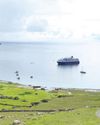
Practical Boat Owner
An adventure to St Kilda
Marsali Taylor swaps skippering her Offshore 8m for being crew on a converted herring drifter, with comfy berths in the former fish hold
8 mins
January 2026
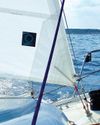
Practical Boat Owner
Mast refit and upgrade
Nicholas Koligiannis explains how he improved the mast on his Albin Ballad
5 mins
January 2026

Practical Boat Owner
Making more noise in fog
Nick Tyler takes the guesswork out of broadcasting fog signals
3 mins
January 2026
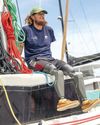
Practical Boat Owner
Solo across the Pacific
Triple amputee Craig Wood sailed into the history books with a non-stop, 90-day, 7,506-mile unassisted voyage
8 mins
January 2026
Practical Boat Owner
Al-assisted Shipping Forecasts
The Met Office has released new data showing a decade of steady improvement in the UK Shipping Forecast, with wind speed and sea state accuracy up by 10% or more.
1 min
January 2026

Practical Boat Owner
Bligh-ted reputation
Making the case for the mutiny on the Bounty's much maligned Captain Bligh
3 mins
January 2026
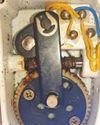
Practical Boat Owner
Wiper motor repair
Richard Stone mends his deck saloon windscreen wipers
2 mins
January 2026

Practical Boat Owner
'Let someone know boat plans' says report into fatal man overboard incident
The importance of designating a shore contact before setting off on a boat trip has been highlighted following a fatal man overboard incident near Inishbofin, Co. Galway, Ireland.
1 mins
January 2026
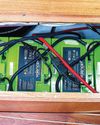
Practical Boat Owner
LITHIUM BATTERIES latest safety advice
Marine engineer and surveyor Marcus Jones unpicks the confusion surrounding the use of lithium batteries and what you should consider if installing them on board your boat
8 mins
January 2026

Practical Boat Owner
How to winterise your motor boat
Jon Mendez explains the steps you need to take to ensure your boat stays in top condition for next season
4 mins
January 2026
Translate
Change font size
